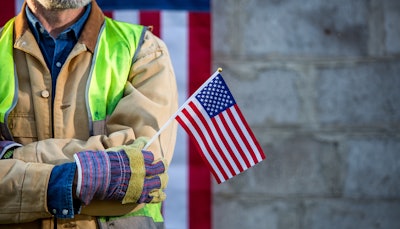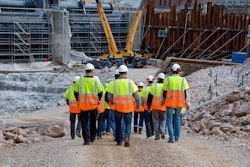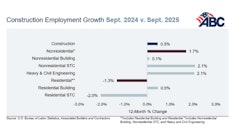
Each November, we publicly honor the contributions of the men and women who have served in the U.S. Armed Forces. With about 200,000 service men and women leaving the U.S. military every year, Veterans Day can also be a time for construction industry leaders to consider how to support these veterans as they enter civilian life.
While veterans bring their skills to a wide range of industries, some find that construction is a fantastic fit for their interests and capabilities. As a result, veterans are a vital segment of the construction workforce; approximately 13.2% of all veterans enter the construction industry after completing their service. Thanks in part to the labor shortage, there are over 412,000 open jobs in construction in the U.S.
An oftentimes untapped, overlooked resource by business owners, veterans bring an overabundance of skills to the workplace. Although Veterans Day is just one day a year, industry leaders can implement year-long initiatives that support current and former military members by hiring veterans. Here we share the key benefits veterans offer, how to recruit and how to support our heroes in hardhats. Construction companies should consider the following.
Solution to a Tight Labor Market
In this tight labor market, businesses are constantly on the lookout for good talent. Today, the construction industry faces skilled labor shortages, cost escalation, a potential recession and supply chain snafus. The sector needs talent who are up to these challenges. Military veterans have trained to respond and adapt to most situations, so they are well equipped to respond accordingly as a civilian.
Recently, the Department of Labor reported the veteran unemployment rate at nearly 1% lower than the national average, illustrating that employers recognize the competitive advantage veterans bring to businesses. By hiring stalwart employees like veterans, employers can persevere through various industry challenges with a plethora of technical and non-technical skills.
Transferable Skills
Military veterans have transferable skills that can benefit construction companies. After being instilled with a strict regimen and training while in the military, veterans have the necessary skills to become invaluable employees.
- Team player: At its essence, the military is a workplace comprised of small teams driven by collaboration, working toward a common goal. Likewise, on a jobsite, cooperation among different groups is essential to the success of a project.
- Adaptable: Service in the military can be unpredictable and veterans have learned to be flexible. Many can handle sudden changes and pick up new information quickly. Similarly, construction is rapidly evolving thanks to new technology, economics and client needs. Yet, veterans in the field have the ability to remain focused, finish tasks, and discover solutions, even in the most complex circumstances.
- Multi-skilled: Members of the military are trained in numerous areas on and off the battlefield. For example, veterans are used to working with everything from advanced machinery to IT systems. Therefore, a veteran's knowledge spans the organizations, making them a valuable hire to plug in nearly any position.
- Organized: Building projects require careful planning and many moving parts. Veterans are used to juggling complex missions and their challenges. Managing supplies and vendors on a jobsite will be second nature.
- Leadership: Military veterans are natural leaders with dual capacities to take orders and lead when situations arise. Leadership skills are crucial in construction in terms of decision-making and team motivation. Construction needs servant leaders who can lead under pressure and motivate teams to work toward the end goal. Veterans have this skill.
For construction leaders, the skills and expertise veterans bring to the workforce can make a significant difference in the current and future success of their organization.
How to Attract Veterans
Business leaders should look at alternative credentials and skill sets veterans bring to the position, even though they may not have direct experience in the industry. With the skills veterans possess from their military training, the technical construction skills are easy to teach.
Veteran organizations are a great place to find these ideal candidates, and you can use their programs or platforms to post and advertise open positions. Additionally, it’s helpful to connect with military bases and assistance groups regularly to meet potential hires and garner interest from military personnel before they depart the military. By connecting with these future candidates before their exit, construction firms can collect contact information and develop a military-friendly recruitment plan.
As firms work to attract and retain this valuable segment of the labor force, many should consider highlighting employee benefits such as compensation, retirement plans and other benefits like education and training opportunities. After service, veterans seek ways to grow their skills and build new careers. Organizations promoting work-life balance will also stand out to veterans looking to make a healthy transition to civilian life.
Companies struggling to recruit veterans should connect with associates and initiatives focused on providing mentorship and direction to veterans and employers. A few organizations to consider include Hiring Our Heroes, Helmets to Hardhats and Hardhat Heroes.
How to Show Support
Simply put, construction companies can support veterans by considering them as viable job candidates. Hiring veterans makes good business sense; employers can stay ahead of the labor shortage, gain loyal and talented employees, and military men and women can discover fulfilling careers.
Skanska’s 1550 on the Green project is an example of how welcoming veterans into the industry is a win-win situation. Construction companies focusing on hiring veterans will develop a highly skilled workforce to meet jobsite and industry challenges head-on. It’s time to encourage more veterans to enter construction to help create a better industry.



















